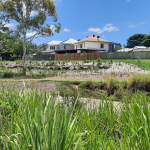Upcoming Events
Like all infrastructure, stormwater control measures (SCMs) and other Water Sensitive Urban Design (WSUD) assets require appropriate maintenance to ensure they are achieving their original purpose. It is subsequently recognised that the operation and maintenance of SCM and other WSUD assets require significant and appropriate resources to ensure their appropriate function. However, anecdotal and published information indicates that these assets are often not being appropriately maintained and are subsequently often not achieving their design objectives. ‘Stormwater utilities’ have been proposed as one solution to provide a stable funding source for stormwater management.
Our upcoming workshop will be a chance to describe and discuss the current status of SCM management in QLD (for both privately and publicly owned assets), and describe/ discuss the potential option for future ‘stormwater utilities’.
The format will include short presentations from an Expert Panel followed by an interactive discussion between the audience and panel. Come along, be involved and debate the many competing issues. A complex challenge that requires broad discussion to provide direction and lead our thinking on this critical topic – don’t miss your chance to contribute in this important area.
Confirmed Expert Panel Members include:
- Jonathon Whitcombe (Moreton Bay Regional Council)
- Andy Hornbuckle (SPEL Environmental)
- Charles Coathup (Renew Solutions)
- Stephen Turfrey (Redlands Shire Council)
Cost:
- Members and students: $65/ person (incl. GST)
- Non-members: $100/ person (incl. GST)
Stormwater Qld is facilitating an opportunity for The Department of Environment and Science to provide a summary of the:
As these guidelines have not been endorsed by Stormwater Queensland we are facilitating this event as a way to allow our members and others to provide feedback to the state on both guidelines. We believe that strategic overview and direction of important issues require feedback to help improvements in this space. Because of this, SQ is providing this event free of charge as we really need our industry to voice their opinions and share their knowledge. Date: Wed 6 March 3:30-5pm Where: Department of Environment and Science 400 George Street Brisbane Qld 4000 No catering provided |
After five years of consultation, collaboration and negotiation, Stormwater Australia released the SQIDEP document in December 2018. The document provides a uniform set of criteria to which all stormwater treatment measures (green & grey) can be field-tested and reported. These criteria should guide and inform field monitoring programs that seek to demonstrate pollutant removals for treatment measures implemented to achieve planning water quality objectives.
This SQ event will be facilitated by Sally Boer, Director, E2Designlab, and include an expanded list of speakers. Alan Hoban, Director, Bligh Tanner, will present on the consultation process and development of the SQIDEP and future. This will be followed by a presentation from Darren Drapper, Principal, Drapper Environmental Consultants, on the SQIDEP technical content and practical implementation. Following these two presentations a panel of speakers will each provide a short summary of their thoughts on the SQIDEP. The panel will comprise: Andy Hornbuckle, SPEL Environmental; Mike Wicks, Stormwater360; Charles Kelly, Humes; Stephen Baker, Rocla; and Andew Macklin, Urban Asset Solutions. Following the panel discussion, you’ll have an opportunity to ask your questions about this important industry benchmark.
Don’t miss this chance to be at the leading edge of this significant step-change in our industry. Following the workshop, there will be an opportunity for networking and further informal discussions over drinks and canapés with industry colleagues.
If you are not currently a Stormwater Queensland member, apply to join today and attend this event at the dicounted member rates. Apply here
Topic: How stormwater can deliver cooler greener cities
Presenters: Kim Markwell – Associate Environmental Scientist of E2Designlab, Chris Tanner – Regional Manager of the CRC for Water Sensitive Cities & Luke McPhail – Integrated Water Management Specialist of Water Technology.
Date: Thursday 11 June 2020
Time: 1.00pm – 1.45pm
Presentation Summary: A growing body of research is demonstrating the linkages between human health and wellbeing and creating cooler urban environments by retaining water in the landscape. This is where stormwater can play a major role in designing liveable cities.
In this webinar Kim Markwell (from E2Designlab) will investigate the drivers to consider urban cooling and demonstrate the multiple benefits which can be achieved through adopting principals of water sensitive cities. Kim will also introduce “Designing for a cool city: Guidelines for passively irrigated landscape”, the newly released national guidelines which looks at considerations for design, construction and maintenance of these systems.
Chris Tanner (from the CRC for water Sensitive Cities) will use a current case study at Norman Ck, Brisbane to showcase the use of CRCWSC tools for economic frameworks, infill development typologies, urban heat and water cycle investigations using a timeline of “Now, New and Next”.
Luke McPhail (from Watertech) will present a demonstration of the newly released Scenario Tool which brings together a range of data sets including climate, demographics and landform in an online GIS platform. Various planning scenarios can be assessed through metrics including Water Balance, Land Surface Temperature and Thermal Comfort.
Registration: This webinar is FREE of charge to all. Follow the link below to register:
Topic: Challenges in transitioning to Sustainable Stormwater Practices: Insights from the Investigation of Stormwater Control Measures Maintenance in Melbourne
Presenters: Andrew Thomas – Vice President, Stormwater NSW
Date: Thursday 25 June 2020
Time: 1.00pm – 2:00pm
Presentation Summary: The expansion of urban development across the globe has brought with it significant environmental impacts. Prominent amongst these impacts is the degradation of marine and freshwater environments caused by conventional approaches to stormwater management infrastructure that facilitate the rapid conveyance of untreated stormwater to waterways. Stormwater control measures (SCMs) are a sustainability innovation developed to redress these environmental impacts. However, there are growing concerns that SCMs are not receiving sufficient maintenance and that, consequently, their long-term performance may be compromised.
This study sought to gauge the veracity of these concerns and ascertain the barriers and challenges to the maintenance of SCMs. Nine local councils in Melbourne, Australia were engaged to provide condition data for their SCMs and access to their professional staff to collect perspectives on the barriers and challenges to SCM maintenance. 55 inter-dependent barriers and challenges were identified across nine sociotechnical categories, confirming SCM maintenance as a complex multi-causal sociotechnical problem, and one potentially symptomatic of a loss of momentum towards mainstream adoption. Termed Failure to Thrive, this loss of momentum is considered a function of three over-arching issues: An under-developed stormwater industry, government policy inertia and, importantly, the invisibility of SCMs in the community.
Three ‘intervention pathways’ are postulated to redress shortcomings in the maintenance of SCMs by Victorian local government and, likewise, address the Failure to Thrive scenario. An alternative transition pathway for Sustainability Transitions is proposed that accounts for the complex path-dependencies involved in the transition of sustainable innovations like SCMs and the need for pro-active institutional work accordingly to minimise the risk of partial or total failed transitions.
Registration: This webinar is FREE of charge to all. Follow the link below to register:
Topic: A Blueprint for Improving Waterway Management
Presenter: Glenn Browning – Civil Engineer at Healthy Land and Water
Date: Thursday 9th July 2020
Time: 1.00pm – 1.45pm
Description: Glenn’s presentation will be on the recently released SPP Review – A Blueprint for Improving Waterway Management. This is an informal document, whose purpose is to prompt discussion and interest regarding future recommended improvements to the State Planning Policy (SPP) – Water Quality State Interest. While SPP amendments are just part of the solution, complimentary recommendations have also been made to improve waterway management more broadly.
The Blueprint for Improving Waterway Management is based on foundational research by Alluvium as well as interviews with many key stakeholders in the stormwater industry. The document proposes 12 strategies across three themes: Protect, Maintain and Enhance. This paper was sponsored by the Department of Environment and Science and is for discussion purposes only. You can directly download the document here.
Topic: Why we should change what the guidelines, codes and specifications say about Manning’s n in the design of grass-lined and rock-lined channels
Presenters: Martin Jacobs – Principal Hydraulics Engineer at Pitt&Sherry
Date: Thursday 23rd July 2020
Time: 1.00pm – 1:45pm
Description: Most guidelines, codes and specifications include tables of fixed Manning’s n values for different types of channels. A few include references to vegetal retardance types, but these are rarely used in practice. It is rarely recognised that Manning’s n varies with depth and that the values used for shallow flow should be much higher than deep flow. This often results in the adoption of inappropriate, low values in the design of shallow grass-lined and rock-lined channels such that the resulting channels could be one third, one quarter or one fifth the size required to convey the design flow. The dynamics of design-and-construct procurement of infrastructure pressure designers into adopting the most favourable, lowest possible value of Manning’s n, which are justified by placing onerous maintenance burdens (mowing) on asset owners.
There are established techniques to estimate the values of Manning’s n for grass-lined and rock-lined channels, based on the underlying theory and empirical experiments. Although they are tedious to work out manually, they can be completed computationally and Martin has developed a program.
By re-writing the codes, guidelines and specifications to recognise the depth-varying nature of Manning’s n, not only will there be better outcomes for design, but also asset owners can balance the competing demands of capital costs and maintenance and continuity can be achieved with water sensitive urban design, which favours the use of grass-lined channels with low velocities.
Registration: This webinar is FREE of charge to all. Follow the link below to register:
Hosted by Stormwater Queensland and Stormwater Victoria, and sponsored by Wave Maintenance.

Topic: WSUD audit, maintenance and rectification insights for assets 5-15 years old.
Presenters: Ralf Pfleiderer – Director at Wave Maintenance
Date: Thursday 17 September 2020
Time: 12.30pm – 1:30pm
Description: This seminar will cover a range of design and construction suggestions gleaned from years of observation and auditing systems, and more recently of maintaining and rectifying raingardens, tree pits and biofilters as part of stormwater harvesting systems. Over the last two years, as director of the new WSUD maintenance company, Wave Maintenance based in Melbourne, Ralf Pfleiderer has been getting up close and personal with mainly assets, doing monthly and quarterly cleaning. This gives you a great insight into how quickly inlets block and sediment accumulates. Over the last two months Wave Maintenance have also rectified over 60 assets ranging in design styles, ages, catchments types and maintenance regimes. The seminar will present aspects that make maintenance easy (and therefore the assets perform well), what designs reduce failure and blockages and what not to do again in the future.
Registration: This webinar is FREE of charge to all.
About The Presenter: Ralf Pfleiderer is a well-respected leader in stormwater across Australia, with over 20 years’ experience in the industry, across public and private enterprise. Ralf is an Environmental Engineer applying his engineering skills within a landscape, green infrastructure and open space context. Ralf has been involved in delivering all stages of WSUD assets from policy to design, undertaking or managing the construction and maintenance to monitoring and auditing a range of large and small WSUD assets for local governments, Melbourne Water and developers. Ralf runs his own consulting practice as well as being a hands-on director at Wave Maintenance.
Topic: Enhancing the Ability of the Agricultural Landscape to Remove Nitrogen: Lessons Learnt
Presenters: Dr Mark Bailey – Director / Senior Scientist at AWC
Date: Thursday 1 October 2020
Time: 1.00pm – 1:45pm
Description: The long-term protection of the Great Barrier Reef requires a co-ordinated and multi-faceted campaign across the atmosphere, ocean and land draining into the GBR. On land, the diffuse movement of sediment, nutrients and pesticides from both the urban and agricultural catchments have been reported to impact the resilience of the reef systems themselves.
While the quality of water draining from the GBR catchments has been extensively measured/modelled, the actual water quality ‘problem’ at the local scale is not well defined. As such, the solution to decreasing the sediment, nutrient and pesticide loads to the GBR in not well understood.
For the past 10 years AWC have been involved in the developed of many strategies for intercepting nitrates and sediments within the agricultural landscape – two priority pollutants for maintaining reef health. This has been a challenging but rewarding experience collaborating with landholders and other stakeholders to develop pragmatic and workable solutions in response to different landholder needs within the individual catchment/farm context.
This webinar will relate the technical and engagement methods employed, outcomes achieved and the mistakes made and how we hope these to assist in the future planning, design and implementation of water quality improvement projects across the agricultural sector. Addressing the challenges facing the GBR requires a significant scaling up of efforts to improve farm and catchment-based management of water quality with input from a broad range of industry bodies, government and non-government organisations, the scientific community and most importantly the farming community. This webinar is intended to assist and guide the many people required to contribute to this effort.
Registration: This webinar is FREE of charge to all. Follow the link below to register:






